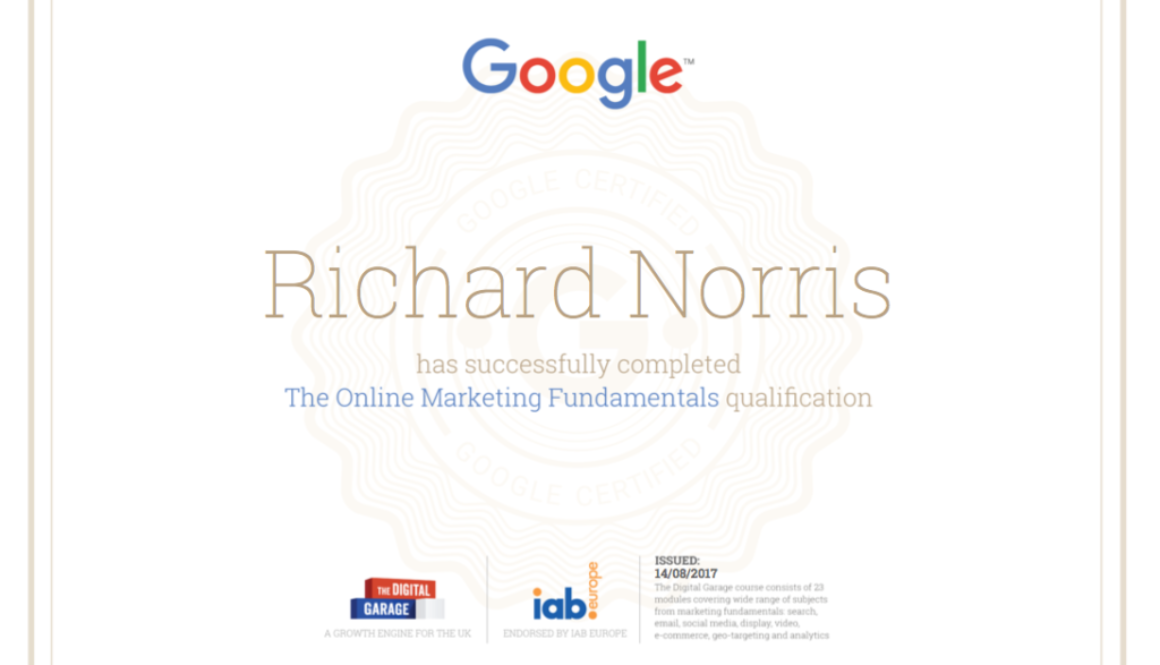I got a certificate from google
As I am now a google-certified online marketing fundamentals expert (yes friends, you may touch me, and it will cure all your temporal and spiritual ailments), I wanted to write about my experience of the google course, and some thoughts on digital marketing.
Online marketing and SEO are now rather like where medicine was in the 19th century – while it is entirely necessary, there are so many quacks around making absurd claims, most of which can’t be assessed until it’s too late. You need to have online marketing in an age where most consumers spend an average of 4 hours of their day online. But anyone who promises you that Professor Fizzbob’s miracle elixir will get you to the tops of the google rankings, guaranteed sir, roll up, roll up, leaves themselves legitimately open to accusations of wearing pants that are currently on fire.
The ‘secret’ to good SEO is the same boring secret that nobody wants to hear about anything, ever – hard graft and winning legitimately. If you have good content, and a few learned strategies, you’ll rise to the top. It’s even quite funny that there are so many snake-oil salesman around in this field, because while Google may have their own special sauce for their search algorithm, they straight up tell you what you need to do to flourish in the online marketing world. They give you all the information you need, and they even put a cherry on top, making it easily digestible and available to anybody.
The google course itself is 23 modules, and each module consists of a few videos, followed by a quiz, then a questionnaire at the end of each module, and then, after completing all 23, a final exam. The videos are like everything google does – clean, neat, cheerful, and terrifyingly efficient. One thing I did find interesting is that the relentlessly chirpy google presenters are scrupulously careful every time to mention Bing without sniggering, which may be commendable, but it’s commendable in the same way Jennifer Lawrence taking the elephant man as her date to the oscars would be commendable – it’s sweet, but we all know she’s just doing it out of kindness. When it comes to search engines, everybody knows there’s only one name in town, and that name starts with a Goo. Seriously, how many people do you know who use Bing? Exactly.
There are of course certain boxes that need to be checked for good online marketing – your site must be mobile responsive, for example, and it shouldn’t be too bloated with large files such that it takes too long to load (incidentally, I can recall on one occasion in 1997 being at my friend Nick’s house, and we attempted to navigate to a music site that took an agonising 5 minutes to load, and I can distinctly remember Nick saying ‘I really wish people wouldn’t use images on their websites. It’s a pain’).
Google do differentiate, quite rightly, between SEO and SEM – one is the optimisation of your site to give yourself the best possible chance of ranking near the top of the organic search results for your preferred keywords. The other is Search Engine Marketing, which is paying money from marketing budget to advertise on search engines. Of course, most powerful of all would be to rank high on the organic search, AND have an ad that appears near it (it’s a psychological quirk of human beings that we tend to trust things that we see more often, so if a company appears twice on the first page of google, they must be the best). Buying ads in this way can be tricky, but also highly effective, because unlike traditional advertising, when you advertise for keywords on a search engine, the people who see your adverts are going to be actively seeking out the very thing that you are offering. That’s advantage one. Advantage two, is that if your ad is not clicked on, you’re not charged for showing the ad.
Search Engine Marketing works by a system of instantaneous auction, where the ‘highest bid’ (which is not necessarily the highest bid, somewhat confusingly), will display highest on the searcher’s results page. The key to this, is to start small. It is possible, indeed highly recommended, to set yourself a budget to spend per day (once your budget is gone, your ad won’t appear, even if it would ‘win’ the auction on those keywords), and begin with a small amount, and increase it incrementally, dependent on experimentation and results. I have got some very good results using this system.
Then of course there is social media, which can be an excellent way of addressing your customers directly, but is also time consuming and difficult to maintain, and everyone finds it a major turn-off to be bombarded with promotional messages on their social media feeds.
Sometimes there’s just no substitute for going out knocking on doors and talking to people. But, google won’t give me a certificate in that, so who cares ?

